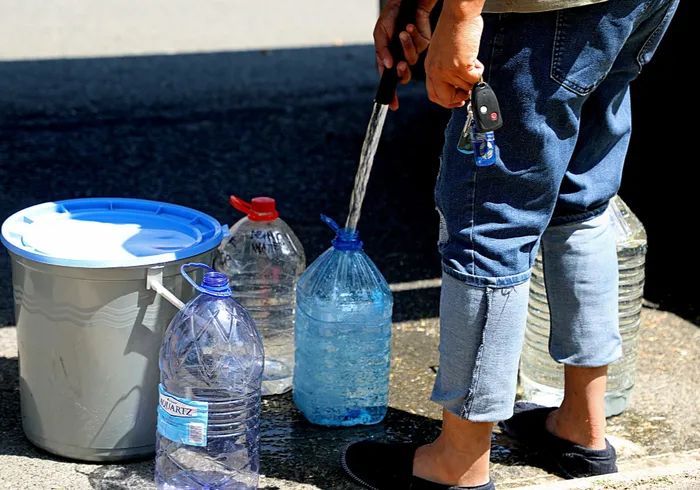
You never miss the water till the well runs dry: Tshwane residents are demanding that the old infrastructure be replaced as the water supply issues persist.
Image: File/ Timothy Bernard / Independent Newspapers
Residents and civic organisations have urged the City of Tshwane to resolve the water supply issues emanating from pipe leaks, bursts, and illegal connections instead of trying to impose a limit on residents, who often go for weeks without water in their taps
At the centre of the controversy is the City’s attempt to set the limit due to overconsumption. Rand Water is pumping 926 million litres per day to Tshwane, when it is supposed to be pumping 662 million litres per day, which is 22% more than the City’s permitted limit. Despite this, water doesn’t reach some residents.
Tshepo Matlaela, a community leader and activist in the Ga-Rankuwa Township, said some communities don’t get water for weeks, which forces them to fetch water from other communities.
“Sometimes we get water tankers to supply it, but it is still a huge inconvenience and a health risk, especially on sanitation, because people cannot flush. We have been engaging the City since August just to secure a meeting, but it has not yet happened. They told us they will come up with an action plan.
“The main priority for Ga-Rankuwa is the replacement of old infrastructure that is causing problems. Communities have come up with structures (street committees) to protect the infrastructure against theft and vandalism, as a way to show our commitment to working with the City of Tshwane on the service delivery issues,” Matlaela said.
Samuel Madire, a community activist in Mamelodi, said their water supply problem is compounded by overpopulation as they now have seven informal settlements that have mushroomed in their community.
“We go for days, sometimes weeks, without water in our taps, and have to rely on water tankers. The people who suffer the most are the elderly and those living with disabilities,” Madire said.
He added that they have petitioned the City to relocate the seven informal settlements, but they have yet to see it being effected.
“Even if the City were to fix the leaks, the illegal connections will continue because people need water in the informal structures as well,” Madire said.
Tshepo Mahlangu, president of LASCA Civic Organisation, said the increased consumption is caused by unfixed leakages, and technical losses are a result of the 580 informal settlements that have mushroomed in the Capital City.
He added that the priority should be on reducing water losses caused by theft and leaks, and that enforcing consumption limits on residents is unfair and demonstrates a lack of governance.
“Water loss amounts to R1.3 Billion (39%), and is man-made. Regrettably, this ongoing man-made problem is directly affecting the residents and businesses. We propose the formalisation of existing informal settlements and curbing further spread, since they are the cause of technical losses. In 2019, there were 216 informal settlements, and in 2024, they increased to 580. Illegal car washes also need to be regulated by the municipality,” Mahlangu said.
King Bongani Ramontja, chairperson of the Soil of Africa Civic Movement (SOA), stated that the water crisis must be treated as a humanitarian and developmental emergency, not a technical inconvenience, because it deepens inequality and threatens the dignity of the people.
“It is unjust to penalise ordinary citizens when the crisis is largely due to administrative negligence, poor maintenance, and a lack of monitoring. The city must urgently invest in infrastructure repairs, introduce real-time monitoring technology, and hold internal departments accountable for inefficiency and corruption in water management,” Ramontja said.
SOA recognises that illegal connections are often a symptom of desperation, not criminal intent. The solution must be socially just and community-driven, not punitive, he said.
“Through our community engagements, SOA has observed that water failures have devastating consequences, including health risks due to lack of hygiene and sanitation, the collapse of small businesses, particularly informal food vendors and laundromats,” he stated.
The City of Tshwane acknowledged the concerns raised by residents and stated that it is implementing measures to improve the reliability of the water supply in Ga-Rankuwa.
The measures include the upgrading of existing infrastructure, replacing outdated infrastructure to minimise faults and interruptions, and dealing with illegal connections and water leaks. The City encouraged residents to support these efforts by using water responsibly and helping to curb excessive consumption.
“The City has noted a significant increase in water consumption… particularly in Ga-Rankuwa, where demand has risen sharply from 46ML/day to 74ML/day. To prevent a total system collapse, the City and Rand Water continuously adjust the system on a daily basis to ensure a stable supply,” the City said.
Tshwane stated that it has made tangible progress in relocating informal settlements as part of its Informal Settlements Upgrading Strategy. To date, 1,719 beneficiaries from the Mamelodi area have been relocated to Pienaarspoort, and an additional 579 have been moved to Leeuwfontein Extension 27.
“The Water and Sanitation Business Unit continues to work closely with the Tshwane Metro Police Department (TMPD) to identify and remove illegal water connections in both informal and formal developments, as these connections contribute to reduced pressure and water shortages in formal areas,” the City said.
For comments and tip-offs, email:
gcwalisile.khanyile@inl.co.za
Related Topics: